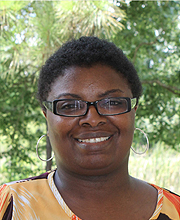Contributor: Alexis L. Franzi, Content and Social Media Specialist, Lakeview Health
 At Lakeview Health, we are fortunate enough to employ some of the most caring and educated people from all over the country. One such person is our Weekend Manager, Angela Malone, M.A., LMHC, who has over a decade of experience in the addiction field.
At Lakeview Health, we are fortunate enough to employ some of the most caring and educated people from all over the country. One such person is our Weekend Manager, Angela Malone, M.A., LMHC, who has over a decade of experience in the addiction field.
She holds a bachelor’s degree in Criminal Justice from Lane College and a master’s degree in Criminal Justice from Southeast Missouri State University as well as a master’s in Counseling from Webster University.
She is currently working on her doctoral degree in Education at Nova Southeastern University and with all of this going on, she took some time to sit down and talk a little bit about the field of addiction treatment.
Q: What drew you to the field of addiction treatment? Why?
Angela: When telling individuals about being in this field, I say it was God’s calling for me. I’ve always tried to run away from the addiction field because it was prevalent in my family. But, I was the child that questioned the who, what, when, where, and why?
My goal in life since the age of 10 was to become a prosecuting attorney. In 2001, I started working in the field as a mental health tech in Missouri and grew to love it. As a tech, I found myself talking to the clients and gaining a better understanding of addiction.
I was working on my master’s in Criminal Justice and started questioning whether I really wanted to put people, such as the ones I was working, in jail knowing they had significant issues. I moved to Jacksonville in 2004 and pursued another master’s in Counseling. I started working with co-occurring disorders and the tug at my heart increased more and more.
I found that I had stopped running away from the field of addiction and it had become a true passion of mine and I want to help people make the transition from a life of desperation to a life of hope and actualization.
Q: What keeps you in this work, day after day?
Angela: I’ve worked in different sectors such as jails, prisons, treatment facilities, and mental health facilities. The common denominator in each sector is addiction. I had an aunt who passed away when I was 10 years old who was a victim of domestic violence and an active alcoholic.
I found in dealing with her death, she wanted help but struggled with asking for help but when she had got to the point of seeking out help; it was too late for her because she lost her life to both domestic violence and her alcohol addiction.
I stay in this work because I feel if I can reach one person that matters more than anything else. I want to be able to help the addict as well as the families understand the concept of addiction and the consequences.
Q: What is your philosophy on addiction treatment?
Angela: Addiction is a disease that impacts individuals mentally, spiritually, and emotionally. The addiction does not only impact the addict and alcoholic, but also the family system. I believe in the holistic approach of treating a patient.
Q: What tools would you like your participants to gain while working with you?
Angela: Since I’ve been working in the field the tools helpful to gain are coping skills, behavioral changes, and learning to deal with life on life terms. I believe in the cognitive behavioral analogy that our thoughts produce feelings and behaviors.
I enjoy helping individuals change the way they think about themselves which leads to a healthier recovery. Our participants are usually tarnished with low self-worth, poor ego strength, guilt, and shame. It is a joy and privilege to be in position to help someone see the true essence of who they really are.
Q: What do you envision the future of addiction treatment to be like?
Angela: There is an increase in the younger population entering treatment facilities. The 12-Step approach will always be a vital piece in a recovery program, but we have to ensure we are utilizing therapy techniques that will reach the younger generation.
Younger individuals are more active and outgoing and are more interested in technology. Addiction treatment can’t be focused on just sitting in a process group and doing talk therapy. I believe the use of technology is going to be an additive in addiction treatment.
The opinions and views of our guest contributors are shared to provide a broad perspective of addictions. These are not necessarily the views of Addiction Hope, but an effort to offer discussion of various issues by different concerned individuals.
We at Addiction Hope understand that addictions result from a combination of environmental and genetic factors. If you or a loved one are suffering from an addiction, please know that there is hope for you, and seek immediate professional help.
Last Updated & Reviewed By: Jacquelyn Ekern, MS, LPC on November 11, 2015
Published on AddictionHope.com
